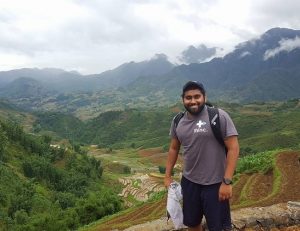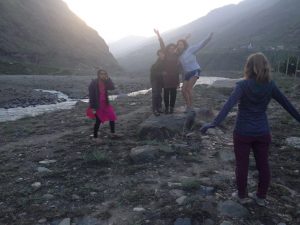Medical Students Learn about Health Care Delivery Around the World
January 23, 2018UNC Global Affairs
Since 2009, over 500 medical students have traveled to communities around the world to complete global health electives and gain a deeper understanding of global healthcare through the University of North Carolina at Chapel Hill School of Medicine’s Office of International Activities (OIA).
Shay Slifko, program manager for the OIA, manages the day-to-day aspects of the program and works with students to connect them with opportunities to expand their medical education beyond UNC’s campus.
“My favorite part is getting to meet face-to-face with all the students who are interested in global health and connecting the students to a really great opportunity,” Slifko said.
Each fall, the OIA hosts workshops to kickoff the new school year and publicize the global experiences that are available for students. After gathering information on their own, interested students meet with Slifko to discuss relevant opportunities and how to move forward. Global electives can be tailored to meet a specific student’s interest, while other electives are offered through reoccurring programs that different groups of students participate in each year.
“There’s no one-size-fits-all,” Slifko said. “I try to get to know each student a little bit and understand what’s motivating them. Typically, after students meet with me, they get a list of a few options based on interest in language, interest in a certain specialty, or maybe they have an ethnic background in a certain country and they’d really like to connect as a visiting medical student with that region’s healthcare system. I typically connect them with a faculty member at UNC so they can have a more rounded second conversation once they feel like they’ve honed in on what might be reaching out to them.”
Each student must have a School of Medicine faculty advisor to register the student for a specific elective course in the advisor’s department.
Considering their busy medical school careers, most students decide to pursue global electives during the summer between their first and second year or during their fourth year. Students have the option to pursue electives where they provide clinical care within the ethical guidelines or they can participate in research-based electives.
“I collect feedback from both the student and the hosting organization to ensure students are practicing within the ethical boundaries of what they are trained to do,” Slifko said. “We send a strong message that students are going as learners and not as providers in any way, and our students understand they are not going independently to just practice medicine.”

Charan Mohan, a second-year medical student from Gastonia, North Carolina, decided to pursue a global elective to fulfill a longtime interest in global health.
“I had a little global health experience in undergrad, but I think I knew I wanted to take that time between first and second year to really explore what global health meant,” said Mohan. “[Global health] is kind of a buzz [phrase] that’s thrown around a lot, so I just wanted to experience that for myself and understand what was included.”
Mohan had been thinking about going abroad when he learned about a research fellowship through the OIA that paired first-year students with researchers across UNC to do research during the summer. Mohan met with different principal investigators before he was matched with Vivian Go, an associate professor in the Department of Health Education at the Gillings School of Global Public Health. Go’s research focuses on HIV interventions among marginalized populations in Asia, specifically Vietnam.
Mohan spent the summer conducting research at four different sites in Northern Vietnam; his project was an epidemiological study that looked at the rates of hepatitis B and C among the area’s population with HIV.
With family roots in India, Mohan had some exposure to Asia, but he never expected to pursue global health in a country like Vietnam. Without knowing a word of Vietnamese, he spent the summer interacting with locals and Dr. Go’s nine-person research team in the capital city of Hanoi.
“The goals of a research project are the same in every country: execute a project and answer a question,” Mohan said. “I learned how to work in a place where you don’t speak the language, how to communicate with people when there’s a language barrier. I also learned and saw how to do research the right way in a foreign country where you might not know people. Building those relationships is very important, so I definitely learned how important relationship and trust building is in any kind of global work.”
While Mohan’s interests led him to pursue a research-based elective, other students, like second-year medical student Anna McKinsey from Asheville, North Carolina, may choose to pursue clinical experiences.
McKinsey, a Kenan Primary Care Medical Scholar, came into medical school knowing that she wanted to devote her career to rural medicine. As part of the Kenan Rural Scholars Program, McKinsey has committed herself to a career in a primary care setting where she will expand healthcare access in rural areas of western North Carolina.
While McKinsey did not plan to pursue a career in global health, she was able to experience a healthcare system with fewer resources through a global health elective. McKinsey had traveled to India as an undergraduate student, and after attending information sessions through the OIA, she found the right program.
“I fell in love with India,” McKinsey said. “I thought it was so beautiful, and the people’s daily lives were something that I wanted to go back and experience again. As I was thinking of programs that fit both the goals of getting to travel and working in a healthcare system that had fewer resources, the Himalayan Health Exchange fit for me.”

McKinsey, along with other medical students, residents and an attending physician, set up clinics along rural areas of the Himalayan mountains.
“Even though India has a public healthcare system, it’s not super functional in this area because it’s so logistically difficult to get personnel, equipment and medical infrastructure into this region,” McKinsey said. “Most of the time, the clinics were set up in close proximity to some sort of health infrastructure, like a school or a community health center, so if somebody needed long-term care, they could find something that existed there throughout the year.”
The program provided McKinsey with the ability to practice supervised basic clinical care appropriate for a medical student learner in areas where resources were less available, similar to the rural North Carolina communities she hopes to help in the future.
While Mohan and McKinsey traveled to different countries with different programs, both agree that they couldn’t have done it without the OIA’s guidance and funding opportunities.
“I’m really grateful to OIA for helping set this up and to Dr. Go and her team for helping with the process,” Mohan said. “I’d definitely say for any medical students considering global health work to go for it, but also do your vetting and your due diligence to make sure what you’re going to do is a sustainable way to do work. I think if done the right way you can only grow and learn from it.”
“Shay from the OIA is wonderful,” McKinsey said. “When meeting with her, she is able to break things down and give a summary of different programs and scholarship opportunities. She had great tips on how to be thorough about the funding application. She’s a great resource for anyone who’s concerned about the money aspect of going abroad.”
As for Slifko, she enjoys seeing how students’ interest for global health develops throughout medical school and into their medical careers.
“It takes a special person with flexibility, adaptability, and curiosity to want to go to medical school and then devote their career or part of their career to working in global health and helping underserved populations,” Slifko said. “Whether they’re actually moving to a low-income country or maybe working in rural parts of North Carolina or anywhere else after graduation, it’s all important. I think some of my favorite parts are when students return and I see them grow from first-year medical students to fourth-year students, and I can see how it [interest in global health] has really taken shape.”
This story first appeared in the 2018 issue of Carolina Passport.
